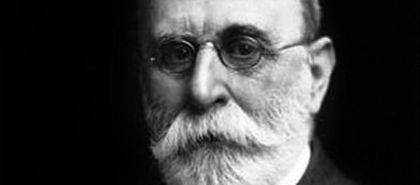A closer look at the eight key arguments of Luther's 1525 masterpiece.

Luther labelled his ‘De Servo Arbitrio’ (On the Bondage of the Will) as his most important work. Princeton giant B.B. Warfield called the book, “The manifesto of the Protestant Reformation”.
Today we want to take a closer look at Luther’s 1525 masterpiece, outlining its key arguments.
1.- Truth matters
The first great conviction that underlies Luther’s treatise is the idea that truth really matters. The Dutch humanist Erasmus (to whom Luther was replying) had smoothed over certain aspects of divine revelation regarding God’s sovereignty and the human will to promote more unity within the Christian camp.
But Luther understood that a church unity not based upon the Christian Gospel could not be a true peace. Whereas Erasmus wanted unity for unity’s sake, Luther sought for a church unity built upon Christian truth.
2.- Definitions matter
Related to Luther’s passion for the truth was his concern for theological precision. He attacks Erasmus on numerous occasions over the Dutchman’s philosophical ambiguity. In expert fashion, the German Reformer showed how Erasmus’s theological system was inconsistent with its own presuppositions.
As many sceptics today, Erasmus defended his ambiguity appealing to the “obscurity” of Scripture; but Luther was having none of it, opting to uphold the perspicuity (clarity) of Scripture, declaring that the biblical message regarding divine sovereignty and human depravity was crystal clear.
3.- Sola Scriptura is fundamental
Luther took aim at Erasmus as the humanist relied too heavily upon extra-biblical authorities. This did not mean that the German was against tradition or reason (Luther, after all, was just as opposed to the Anabaptists as he was to the Romans), but he did try to submit them to the overarching authority of Sacred Writ.
Throughout the book, the German calls into question various ideas promulgated by Aristotle, Jerome and Chrysostom (to name but a few) that Erasmus had employed to give substance to his arguments.
Luther makes the evangelical principle of Sola Scriptura shine forth, namely, that the Bible is the supreme authority in matters of faith and conduct. This explains why the Reformer writes so amiably of folk like Augustine, Wycliffe and Huss as they shared the same passion for scriptural authority.
4.- God is sovereign
The key principle that serves as Luther’s thesis is the sovereignty of God. This doctrine is the hub of the theological wheel. When Luther refers to God’s sovereignty, he is not just alluding to the Lord’s divine prerogative over creation, inanimate objects and animals.
Sovereignty also has to do with the sphere of humanity. There is nothing in the human being –not even his (her) will- that exists independently from God.
Since Luther’s God is sovereign in the absolutistic sense of the term, everything that occurs in the universe is thanks to the divine decree. God knows what will happen tomorrow.
He does not know so due to His foreknowledge (i.e. his ability to see the future); but rather on the basis of His decree. In other words, God knows what will happen in the future because He has already decreed what is to occur. The Father’s foreknowledge, then, depends upon His eternal decree (and not the other way around).
At the end of the day, if the Lord were to study what was going to happen tomorrow this would surely imply that there are things outside of His all-determining control.
What strange force is at work that God must passively observe? In reality, all things –the past, the present and the future- are entirely in the hands of the Omnipotent One.
In this sense Luther criticizes Erasmus’ vision of God for being far too human. The German believed in a wholly sovereign Potentate whereas Erasmus’ deity was only partially mighty.
5.- Human autonomy is a myth
Free-will, the theme at stake in the Luther-Erasmus debate, is inextricably linked to the question of divine sovereignty. Erasmus’ compromised doctrine of human autonomy was what initially led to the publication of Luther’s tome.
 Luther's book was a response to the Dutch humanist, Erasmus of Rotterdam.
Luther's book was a response to the Dutch humanist, Erasmus of Rotterdam.As we have just pointed out, the God of Scripture sets no limits to His lordship. He is the God of the cosmos, of plants and animals, and even of human beings.
There is no such thing, then, as an autonomous or independent human (not even in the sphere of his (her) will). In each moment, humankind lives and moves in God. This observation is vital in order to grasp the central argument of the book.
Erasmus taught that there were three realms at work in life. There is the divine sphere, the diabolical sphere and then the free-will sphere. This meant that men (women) had certain freedom in the area of their wills whereby they could choose God or the devil.
A person, therefore, could ultimately choose whether he (she) wanted to be servant of the Lord or a servant of sin.
Luther, however, lambasted this tripartite division, accusing Erasmus of having denied the Word of God.
According to the reformer, there are not three spheres but two. Human autonomy is a total myth. One is either under the lordship of the Almighty or the lordship of Satan. That simple!
Luther thus proceeded to bring the concept of free-will into disrepute by pointing out that in no fashion can the human will be “free”. One who is a slave is by definition not free.
All humanity is divided up into two blocks: servants of righteousness and servants of iniquity. There is no third group. The servant’s will is conditioned by his lord. This explains why God’s servants delight in the Gospel whereas the slaves of darkness take joy in their depraved lusts.
Hence in Luther’s analysis, the sinner does indeed have a will; but his will is not “free” as it is entirely fallen, corrupt and entirely under the power of sin. Human autonomy is a non-entity; a mere figment of the humanist’s imagination.
6.- Free-will annuls grace, Christ and the Spirit
Luther’s first reaction against free-will stems from his burning conviction that God is almighty and sovereign. Nevertheless, Luther also observes that if there is a sphere where man (woman) is wholly autonomous and able to choose or reject God by his (her) own power of the will, three other concerns immediately arise.
Luther repeatedly points out that free-will is a denial of grace, of Christ and of the Holy Spirit. How come?
First of all, it is a rejection of effectual grace because Erasmus taught, in Vatican-mode, that those who cooperate with grace will be saved. That is to say, salvation is a mixture of divine grace and human merit.
Luther’s response, as can be imagined, is that the New Testament doctrine of salvation is that it is all of grace. The impious one has no merit whatsoever in his eternal salvation. He cannot cooperate with the light of God as he (she) is enthralled about darkness.
It is God Himself who resurrects the sinner, granting him (her) eternal life by His sovereign and effectual grace. It is a grace that actually effects something. It gets the job done, so to speak. It does not need humankind’s approval.
Secondly, free-will, as Luther sees it, blasts Christ’s expiatory work as it does away with the sufficiency of Saviour’s righteousness to wholly justify condemned sinners before the Father.
The imputation of Christ’s righteousness is enough, more than enough, to rescue the sinner from eternal condemnation. If justification could be granted to the sinner independently of Christ’s righteousness, then why did the Son of God have to die? Either Christ is everything or He is nothing!
We are either justified before God entirely on the perfect and impeccable righteousness of Christ or we ourselves become co-saviours. But again, how can a spiritual corpse (as fallen humankind indeed is) ever choose the holiness of God if everything that is in the human heart detests the light of God’s glory?
 B.B. Warfield designated Luther's tome as
B.B. Warfield designated Luther's tome as Finally, the idea of free-will also downplays the Holy Spirit as it suggests that fallen men (women) can do what only the Spirit of God can do, namely, produce spiritual life, regeneration. It is impossible for any sinner to save himself (herself).
Every child of Adam is at enmity with God. Their hearts are rebellious. Only the Spirit of God can lift up a dead sinner from such a deplorable condition, making him (her) into a new creature.
For these three reasons, Luther was more fully convinced that Erasmus’s concept of free-will had missed the mark and was ultimately denying the good news of the Christian message.
7.- By the Law is the knowledge of sin
An abysmal difference between Luther and Erasmus is how the two thinkers thought about the Law.
In his defence of free-will, at no point does Erasmus any positive exegesis of Scripture to prove the doctrine, he simply appeals to an avalanche of texts where sinners are commanded to obey the Law of the Lord.
If God calls a man (woman) to obey Him, muses the Dutchman, then it stands to reason that he (she) is able to fulfil the Lord’s commands.
Conversely, Luther roared against this non-apostolic interpretation of the Law. Erasmus had completely bypassed the New Testament explanation that by the Law is the knowledge of sin (Romans 3:20, a text Luther will quote again and again).
The purpose of the Law is not to show that sinners can somehow keep the divine commands; but rather, it serves to reveal their complete incapacity and powerlessness to do so. Since Erasmus’ hermeneutic of the Law is not subjected to the apostolic authority of Paul, both his theology and anthropology are radically warped.
So, when Erasmus quotes texts from the Law saying: “Do this! Don’t do that! Follow the Lord!” Luther replies: “I cannot! I cannot! I cannot!” The Law reveals our powerlessness; not our potential.
8.- There are ‘two’ divine wills
One final theological point is the line that Luther draws between God’s secret and revealed will. The German evokes this distinction to harmonize the texts that on the hand affirm that God wants all to be saved and on the other hand, those that explain that God has not ordained all to salvation.
God could save everyone on planet earth if He so desired.
The reformer applies this principle to such texts as Ezekiel 33:11 wherein God proclaims that He does not wish for the sinner to die but rather that he (she) would live. Why would the Lord say He wanted all to live and then not decree for that to be so? What is that makes God choose some and not others? Why do some go to heaven and others to hell? Luther’s only answer is that it is not for us to impiously pry into such elevated matters.
Christians are called to be faithful to the revealed will of God (in Scripture) and to let the Lord carry out His own secret will (which He has not made known to us). If anyone felt led to slam God’s non-revealed will, the apostolic response could be used against him (her): “But, oh man, who are you to reply against God?” (Romans 9:20).
Conclusion
All in all, ‘On the Bondage of the Will’ is a wholesome theological and spiritual banquet. If Luther were still amongst us today, it is my conviction that he would be overwhelmed at the triumph of Erasmus’s philosophical postulates in contemporary evangelicalism.
Somewhat extraordinarily, twenty-first Protestantism which was birthed into the world some five-hundred years ago fighting against the Roman doctrine of free-will now crowns the doctrine which it once branded as heretical.
But, thanks to be God, that there is a fresh breeze blowing throughout the nations. Tens of thousands, just like Luther, are turning back to glorious doctrines of God’s sovereign grace. Who knows? Maybe the Lord has another Luther, another Zwingli or another Calvin set aside for such a time as this.
Soli Deo Gloria!

Las opiniones vertidas por nuestros colaboradores se realizan a nivel personal, pudiendo coincidir o no con la postura de la dirección de Protestante Digital.
Si quieres comentar o